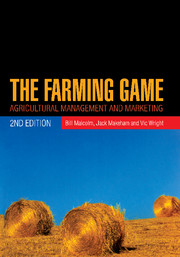Book contents
- Frontmatter
- Contents
- Preface
- Acknowledgments
- List of figures and tables
- 1 Introduction
- 2 The business of farming
- 3 Analysing a farm business
- 4 Analysing innovation in the whole farm business
- 5 Managing risk and uncertainty
- 6 Marketing agricultural products
- 7 Conclusion
- Discounting procedures and tables
- References and further reading
- Glossaries
- Index
- References
3 - Analysing a farm business
Published online by Cambridge University Press: 05 June 2012
- Frontmatter
- Contents
- Preface
- Acknowledgments
- List of figures and tables
- 1 Introduction
- 2 The business of farming
- 3 Analysing a farm business
- 4 Analysing innovation in the whole farm business
- 5 Managing risk and uncertainty
- 6 Marketing agricultural products
- 7 Conclusion
- Discounting procedures and tables
- References and further reading
- Glossaries
- Index
- References
Summary
The focus of farm business analysis is the current situation, the potential and constraints, and the risks and uncertainties. The principles that need to be applied to understand the mix of economic, technical, financial, growth and risk factors that are part of the whole farm system, and the environment in which it operates, are explained.
Technical Basis of Economic, Financial, Growth and Risk Analysis
Agricultural production is the process of using resources to make goods or provide services. Producers can use combinations of the three broad classes of factors of production called labour, capital and raw materials to produce one or many products. A key element in a farmer's decision about what to produce and how to produce it is the objective of getting more, or even the most, out of the limited amount of resources with which he or she has to work.
There are three basic technical relationships in production:
the relationship between the amount of a resource used and the amount of production (called input–output);
the different ways resources can combine and substitute for one another in the production process (called input–input); and
the relationship between different products that can be produced with the resources that are available (called output–output).
Input–output in the current production period
Consider a simple hypothetical situation: a farmer has some land, labour, machinery and equipment, and the finance to buy the seed, fertiliser, fuel and chemicals needed to work the land and grow a crop, using his or her own labour.
- Type
- Chapter
- Information
- The Farming GameAgricultural Management and Marketing, pp. 67 - 122Publisher: Cambridge University PressPrint publication year: 2005



